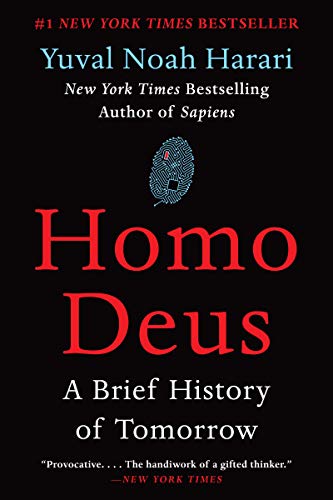Homo Deus: A Brief History of Tomorrow Link to heading
Summary Link to heading
“Homo Deus: A Brief History of Tomorrow” is authored by Yuval Noah Harari and serves as a sequel to his previous work, “Sapiens: A Brief History of Humankind”. While “Sapiens” explored the history of humanity, “Homo Deus” focuses on the future possibilities for humankind. Harari examines how humans have moved beyond the major survival challenges like famine, plague, and war and now grapple with more complex goals, such as achieving happiness, immortality, and divinity status. As technology and artificial intelligence continue to evolve, Harari posits that humans are embarking on a path to become god-like figures, hence the term “Homo Deus”. The book delves into themes such as the potential end of humanism as the dominant ideology, the rise of dataism, and the ethical considerations of biotechnology and AI.
Review Link to heading
“Homo Deus” has been widely praised for its thought-provoking examination of potential futures shaped by technological advances and philosophical shifts. Harari’s detailed extrapolation of current trends and their potential impact on the future captures the imagination and encourages deep reflection about humanity’s path forward. However, some critics argue that the book can be overly speculative and may rely on broad generalizations. While Harari’s insights are compelling, they sometimes lack concrete empirical support. Regardless, “Homo Deus” remains a stimulating read that challenges readers to consider the moral and ethical dimensions of a rapidly changing world.
Key Takeaways Link to heading
- Shift of Human Challenges: Traditional problems like famine, plague, and war are being replaced by quests towards immortality, happiness, and god-like powers.
- Rise of Dataism: The increasing importance and reliance on data and algorithms could redefine societal structures and ethical norms.
- Technological Impact: Emerging technologies will drastically alter human biology and psychology, making existing human-centric ideologies obsolete.
- Future of Humanism: As humans gain powers traditionally attributed to gods, humanism may decline in favor of new ideologies that prioritize data and technology.
Recommendation Link to heading
“Homo Deus” is recommended for readers interested in futurism, technology, philosophy, and the potential societal impacts of scientific advancements. Academics, technologists, and policymakers who are considering the broader implications of AI and biotech developments may find this book particularly enlightening. Harari’s work encourages readers to critically assess the trajectory of humanity and the ethical frameworks guiding future technological progress.
